Ashka Jhaveri, Peter Mills, Kathryn Tyson, Brian Carter, Amin Soltani, and Nicholas Carl
The Iran Update provides insights into Iranian and Iranian-sponsored activities abroad that undermine regional stability and threaten US forces and interests. It also covers events and trends that affect the stability and decision-making of the Iranian regime. The Critical Threats Project (CTP) at the American Enterprise Institute and the Institute for the Study of War (ISW) provides these updates regularly based on regional events. For more on developments in Iran and the region, see our interactive map of Iran and the Middle East.
Note: CTP and ISW have refocused the update to cover the Israel-Hamas war. The new sections address developments in the Gaza Strip, the West Bank, Lebanon, and Syria, as well as noteworthy activity from Iran’s Axis of Resistance. We do not report in detail on war crimes because these activities are well-covered in Western media and do not directly affect the military operations we are assessing and forecasting. We utterly condemn violations of the laws of armed conflict and the Geneva Conventions and crimes against humanity even though we do not describe them in these reports.
Click here to see CTP and ISW’s interactive map of Israeli ground operations. This map is updated daily alongside the static maps present in this report.
Key Takeaways:Israeli forces advanced to a Hamas security headquarters in the northwestern Gaza Strip.
Israeli forces conducted clearing operations west of Jabaliya city in the northwestern Gaza Strip.
Hamas and other Palestinian militia fighters are continuing their attacks against the IDF behind the Israeli forward line of advance, which is consistent with the nature of clearing operations.
Palestinian militias launched the fewest number of indirect fire attacks into Israel since the Israel-Hamas war began.
Palestinian militia fighters clashed with Israeli forces six times in the West Bank.
The Lions’ Den claimed its first attacks in the West Bank since the Israel-Hamas war began. The Lions’ Den continues to emphasize its alignment with Hamas.
Lebanese Hezbollah (LH) and other Iranian-backed militias conducted three cross-border attacks into northern Israel.
The United States conducted an airstrike on an IRGC weapons storage facility in eastern Syria in response to continued Iranian-sponsored attacks in Iraq and Syria, which injured three US servicemembers.
The Islamic Resistance in Iraq—a coalition of Iranian-backed Iraqi militias—claimed responsibility for an additional five attacks on US forces in Iraq, most of which occurred after the US airstrike in Syria. Abu Alaa al Walai—the secretary general of Iranian-backed Iraqi militia Kataib Seyyed ol Shohada—announced his group’s support for attacks against US forces in Iraq.
The Houthi movement claimed that it fired multiple unspecified ballistic missiles targeting “sensitive sites” near Eilat in southern Israel on November 9, marking the sixth attempted Houthi attack on Israel.
Iranian President Ebrahim Raisi met with Turkish President Recep Tayyip Erdogan on the sidelines of the Economic Cooperation Organization summit in Tashkent to discuss the Israel-Hamas war.
Gaza Strip
Axis of Resistance campaign objectives:Erode the will of the Israeli political establishment and public to launch and sustain a major ground operation into the Gaza Strip
Degrade IDF material and morale around the Gaza Strip
Israeli forces advanced to a Hamas security headquarters in the northwestern Gaza Strip. The Israel Defense Forces (IDF) said that infantry, armor, engineering, and special forces units raided the security headquarters, which included intelligence and air defense headquarters.[1] The IDF killed 50 Palestinian fighters while clearing the infrastructure, which included an underground tunnel system. The IDF published a map of the area, detailing several tunnel shafts in close proximity to each other. These clusters of tunnels could enable the hit-and-run attacks on Israeli forces that CTP-ISW has observed.[2] An independent analyst on X (Twitter) geolocated footage that Hamas published on November 8 showing militia fighters firing rocket propelled grenades (RPG) at Israeli forces in the security headquarters.[3]
Israeli forces conducted clearing operations west of Jabaliya city in the northwestern Gaza Strip. The IDF located a Hamas weapons production and storage facility inside a residential building in the Sheikh Radwan neighborhood. Israeli forces found drone parts, explosives, and operational plans in addition to a tunnel shaft with a cooling system.[4] IDF spokesperson Daniel Hagari said on November 8 that the militia fighters have connected the tunnels to water and oxygen systems in preparation for a prolonged stay in them.[5] The al Qassem Brigades—the militant wing of Hamas—claimed to destroy an IDF tank with an RPG north of Sheikh Radwan neighborhood on November 9.[6] An IDF combat team engaged in 10 hours of fighting in western Jabaliya on November 8, during which it seized weapons and exposed tunnel shafts.[7] The al Quds Brigades—the militant wing of Palestinian Islamic Jihad (PIJ)—launched mortars at Israeli forces operating in the area.[8]
Hamas and other Palestinian militia fighters are continuing their attacks against the IDF behind the Israeli forward line of advance, which is consistent with the nature of clearing operations. Local media reported violent clashes east of Beit Hanoun on November 9 after the IDF reported that its forces conducted ground operations there the previous day.[9] The al Qassem Brigades claimed to ambush Israeli infantry forces near Juhr al Dik, which is consistent with CTP-ISW's assessment that Palestinian militias are attempting to harass and disrupt Israeli ground lines of communication.[10] Palestinian militia fighters separately launched mortars at an Israeli command center in the northwestern Gaza Strip on November 8.[11] Fighting behind the Israeli forward line of advance is consistent with the doctrinal definition of "clear,” which is a tactical task that "requires the commander to remove all enemy forces and eliminate organized resistance within an assigned area.”
The National Resistance Brigades—the militant wing of the Democratic Front for the Liberation of Palestine (DFLP)—claimed an RPG attack on an IDF personnel carrier northwest of Gaza city.[12] The al Aqsa Martyrs’ Brigades—the self-declared militant wing of Fatah—similarly claimed to fire mortars at Israeli forces in the northwestern Gaza Strip.[13]
Palestinian militias launched the fewest number of indirect fire attacks into Israel since the Israel-Hamas war began. The al Qassem Brigades claimed responsibility for two indirect fire attacks all in southern Israel. The al Quds Brigades claimed responsibility for one indirect fire attack. Hamas and PIJ have taken measures to prepare for a prolonged war, including reducing indirect fire attacks to conserve stockpiles.[14]
Hamas leaders met with officials from the Egyptian Intelligence Agency in Cairo to discuss a hostage exchange for humanitarian aid. Hamas Political Bureau Chairman Ismail Haniyeh, former Hamas Political Bureau Chairman Khaled Meshaal, and senior Hamas official Khalil al Haya met Egyptian Intelligence Agency chief General Abbas Kamal, according to reports on November 9.[15] Egyptian officials said that the group discussed a deal in which Hamas releases hostages in exchange for humanitarian aid.[16] Unnamed sources from Egypt, the United Nations, and a Western diplomat said that a three-day truce is being negotiated to allow humanitarian aid and fuel to enter the Gaza Strip in exchange for hostages.[17]
An unnamed source separately told Reuters that CIA Director William J. Burns and Mossad chief David Barnea met with Qatari Prime Minister Mohammed bin Abdulrahman al Thani in Doha to discuss hostage negotiations and releases.[18] The source stated that this meeting intended to bring all three sides of the deal together for a quicker process.[19]
US National Security Council spokesperson John Kirby said that Israel will begin to implement a daily four-hour humanitarian pause in areas of the northern Gaza Strip.[20] Kirby said during a press briefing that there will be no military operations in these areas during the pause and that the process is starting on November 9.[21] A pause is temporary, localized, and for a specific purpose to help with hostage releases and for humanitarian assistance, according to Kirby.[22] The IDF said there have been three humanitarian pauses in the northern Gaza Strip at the request of the United States.[23] The United States and Israel have been clear that a ceasefire—a mutual agreement between warring parties to stop hostilities—is not in order.[24]
Recorded reports of rocket attacks; CTP-ISW cannot independently verify impact.
Recorded reports of rocket attacks; CTP-ISW cannot independently verify impact.
West Bank
Axis of Resistance campaign objectives:Draw IDF assets and resources toward the West Bank and fix them there
Palestinian militia fighters clashed with Israeli forces six times in the West Bank on November 9. The al Aqsa Martyrs’ Brigades engaged Israeli forces in four small arms clashes and conducted two IED attacks across the West Bank.[25] These attacks included an hours-long small arms engagement and IED attacks targeting Israeli forces in the Jenin refugee camp in the northern West Bank.[26] The al Qassem Brigades also clashed with Israeli forces in the Jenin camp.[27] The Jenin Battalion of the al Quds Brigade clashed with Israeli forces and conducted IED attacks targeting Israeli forces in unspecified areas in Jenin.[28] A Palestinian journalist reported that some forces from the Palestinian Authority (PA) joined the clashes against Israeli forces in Jenin but that the PA did not order these fighters to engage Israeli forces.[29] The IDF claimed to have killed 12 fighters during the raids in the Jenin camp and arrested two al Quds Brigade fighters on November 9.[30] The IDF also conducted a drone strike on fighters in Jenin who had "endangered” Israeli forces.[31] Hamas and the Lions’ Den—a West Bank-based Palestinian militia—released statements on November 9 calling for further mobilization against Israeli forces across the West Bank, especially in the Jenin camp.[32]
The Lions’ Den claimed its first attacks in the West Bank since the Israel-Hamas war began in a statement on November 9. The Lions’ Den claimed that it had participated in 14 shootings in multiple areas near Nablus but did not specify the dates of the attacks.[33] Unspecified fighters have conducted shooting attacks targeting Israeli forces and civilians in October and November 2023 in the same locations that the Lions’ Den claimed it has attacked.
The Lions’ Den continues to emphasize its alignment with Hamas. The Lions’ Den said that the West Bank will be "a sword and a shield for Mohammed Deif and Saleh al Arouri” on November 9.[34] Mohammed Deif is the commander of Hamas’ al Qassem Brigades and Saleh al Arouri is Hamas Political Bureau deputy chairman. The Lions’ Den previously described itself as “a sword in the hand of Commander Mohammad Deif” on October 26.[35] These statements mark a departure from previous Lions‘ Den claims that described the group as being not affiliated with any specific Palestinian faction.[36]
This map is not an exhaustive depiction of clashes and demonstrations in the West Bank.
Southern Lebanon and Golan Heights
Axis of Resistance campaign objectives:Draw IDF assets and resources toward northern Israel and fix them there
Set conditions for successive campaigns into northern Israel
Lebanese Hezbollah (LH) and other Iranian-backed militias conducted three cross-border attacks into northern Israel on November 9. LH claimed a rocket attack targeting an Israeli mechanized infantry unit near the northern Israeli town of Shomera.[37] LH also conducted an anti-tank guided missile attack targeting an Israeli Merkava tank operating in Metula.[38] Unspecified fighters separately fired one anti-tank guided missile targeting Israeli forces near Mitzpe Adi.[39]
Iran and Axis of Resistance
Axis of Resistance campaign objectives:Demonstrate the capability and willingness of Iran and the Axis of Resistance to escalate against the United States and Israel on multiple fronts
Set conditions to fight a regional war on multiple fronts
The United States conducted an airstrike on an IRGC weapons storage facility in eastern Syria in response to continued Iranian-sponsored attacks in Iraq and Syria, which injured three US servicemembers on November 8.[40] Unspecified Iranian-backed militias fired rockets targeting US forces in eastern Syria on November 8.[41] US officials reported that the attacks inflicted minor injuries on three US servicemembers, who quickly returned to duty after the attacks.[42] Iranian-backed militias again fired short-range rockets targeting US forces at al Omar oil field following the US airstrike.[43]
The Islamic Resistance in Iraq—a coalition of Iranian-backed Iraqi militias—claimed responsibility for an additional five attacks on US forces in Iraq, most of which occurred after the US airstrike in Syria. The Islamic Resistance in Iraq and its affiliated groups have claimed 50 attacks targeting US forces in the Middle East since October 18.The Islamic Resistance in Iraq claimed two separate one-way attack drone attacks targeting US forces at al Harir Air Base in northern Iraq on November 8 and 9.[44] One attack occurred on November 8 before the US airstrike in Syria. The other occurred on November 9 after the US airstrike. The Islamic Resistance in Iraq released a video showing the launch of two unspecified drones.[45] Iraqi Kurdistan counterterrorism forces reported that the attack on November 9 destroyed one of the fuel depots at al Harir airbase.[46]
The Islamic Resistance in Iraq claimed three separate missile and one-way drone attacks targeting US forces at Ain al Assad airbase in western Iraq on November 9.[47] The group released a video showing it launching two drones and three missiles. The missiles bared visual similarities to the group’s al Aqsa-1 missile.[48] The Islamic Resistance in Iraq claimed on November 6 it launched its al Aqsa-1 missile at an unspecified US base in the Middle East for the first time.[49] The al Aqsa-1 missile bears visual similarities to the Iranian-built Fateh-313, which the Iranians used to target US positions in Iraq in January 2020 in retaliation for the US airstrike that killed IRGC Quds Force Commander Major General Qassem Soleimani.[50]
Unspecified fighters conducted an IED attack targeting a joint US-Iraqi Counter Terrorism Service patrol near the Mosul dam in northern Iraq on November 9.[51] A US official reported that the attack caused no casualties.[52]
Abu Alaa al Walai—the secretary general of Iranian-backed Iraqi militia Kataib Seyyed ol Shohada—announced his group’s support for attacks against US forces in Iraq. Walai stated that attacks on US forces would continue until there is a ceasefire in the Gaza Strip.[53] Kataib Seyyed ol Shohada was formerly part of another Iranian-backed Iraqi militia Kataib Hezbollah and has fought in Syria on behalf of Iran in Syria in recent years.[54]
The Houthi movement claimed that it fired multiple unspecified ballistic missiles targeting “sensitive sites” near Eilat in southern Israel on November 9, marking the sixth attempted Houthi attack on Israel.[55] The Houthi military spokesperson stated that these attacks would continue until Israel halts its military operations in the Gaza Strip.[56] The IDF used its Arrow anti-ballistic missile defense system to shoot down a missile south of Eilat.[57]
Unidentified fighters separately conducted a one-way drone attack into Eilat on November 9.[58] The attack caused no casualties, and no actor has claimed responsibility for the attack at this time.[59]
US officials confirmed that the Houthis shot down a US MQ-9 Reaper drone on November 8 in international airspace near Yemen.[60] The Houthi military spokesperson released a video on November 8 showing the shoot down of the drone.[61]
A Syrian journalist said that Iranian-backed Iraqi militia Harakat Hezbollah al Nujaba’s Syria-based Golan Liberation Brigade announced that it is in a “state of full mobilization” on November 8.[62] Harakat Hezbollah al Nujaba is active in Syria and formed the Golan Liberation Brigade in 2017 with the expressed mission of liberating the Golan Heights from Israel.[63] The Golan Liberation Brigade operates in Syria along the Israeli border.[64] CTP-ISW has not yet observed this brigade conducting attacks against US forces or into Israel, though Iraqi militias like Harakat Hezbollah al Nujaba frequently have overlapping membership between the formal militia subordinated to the Iraqi Popular Mobilization Forces (PF) and covert action cells that conduct attacks against US forces.[65]
The reported announcement from Harakat Hezbollah al Nujaba’s Golan Liberation Brigade is consistent with an effort by Iran’s Iraqi proxy network to mobilize its forces in preparation to fight the United States and Israel. The PMF Chief of Staff and Iranian proxy Abu Fadak al Mohammadawi previously said that the PMF is in a “state of emergency” on November 2 in response to ”American threats” to respond to attacks against US forces.[66] US Secretary of State Antony Blinken warned Iraqi Prime Minister Mohammed al Sudani that the United States would "protect its people" in response to Iranian-backed Iraqi militia attacks in a meeting on November 5.[67] Abu Fadak is also the secretary general of Iranian-backed Iraqi militia and US-designated foreign terrorist organization Kataib Hezbollah.[68] Abu Fadak replaced key Iranian proxy Abu Mahdi al Muhandis as head of Kataib Hezbollah in 2020.[69] KH has repeatedly threatened to attack US military positions in recent weeks and is part of the Islamic Resistance in Iraq.
Iranian President Ebrahim Raisi met with Turkish President Recep Tayyip Erdogan on the sidelines of the Economic Cooperation Organization summit in Tashkent on November 9 to discuss the Israel-Hamas war.[70] Raisi emphasized Iranian-Turkish coordination ahead of the upcoming Organization of Islamic Cooperation (OIC) meeting on November 12 to ensure “effective action” to halt Israeli attacks into the Gaza Strip and to provide humanitarian aid. Other Iranian officials have been coordinating with other Arab and Muslim countries in anticipation of the OIC meeting, as CTP-ISW previously reported.[71] This is consistent with the Iranian effort to disrupt Israeli normalization with Arab states by concentrating attention on the Palestinian cause.[72] Iran has repeatedly used the OIC as a platform for uniting Arab and Muslim countries against Israel and impeding the Arab-Israeli normalization process, as CTP-ISW previously reported.[73]
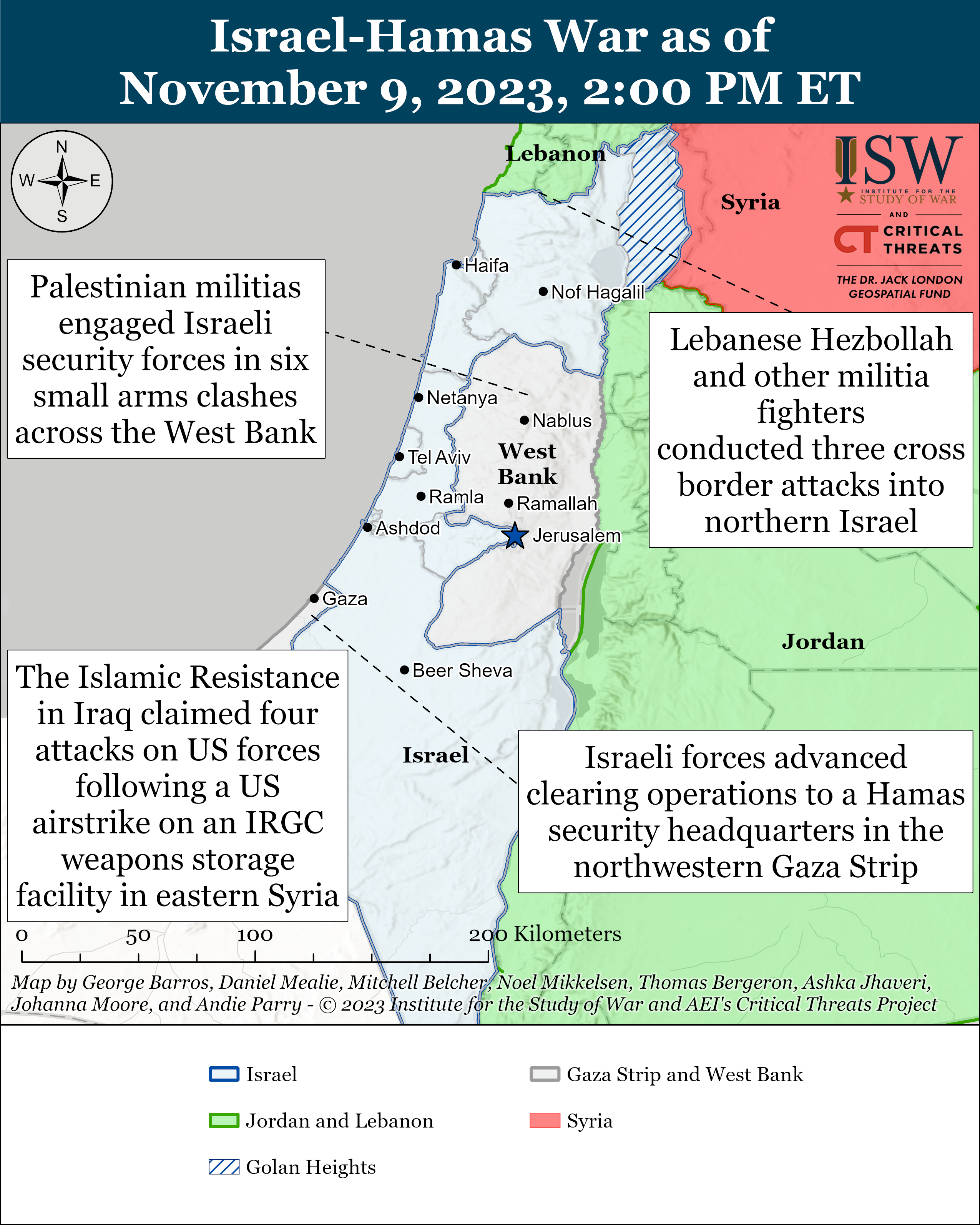
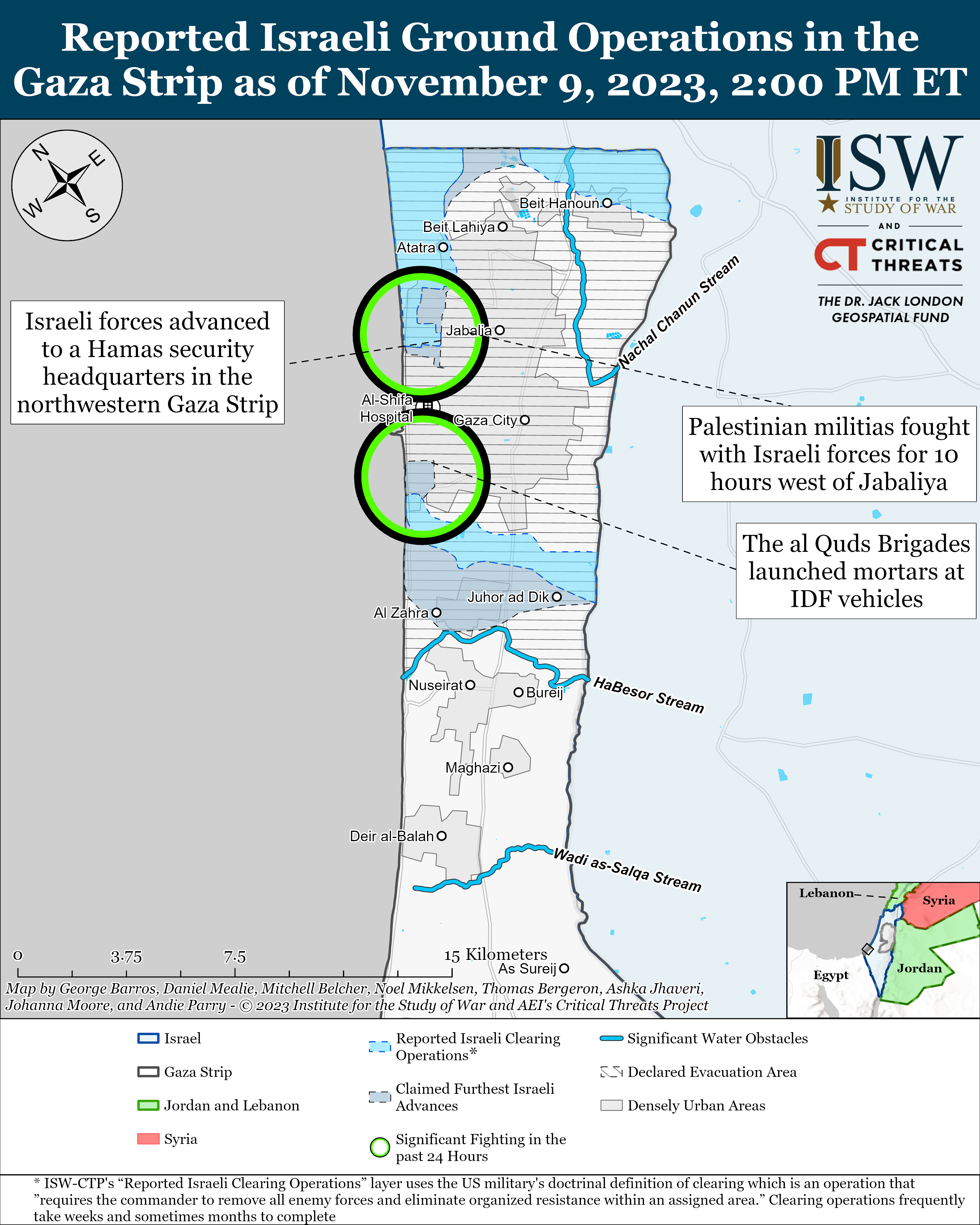
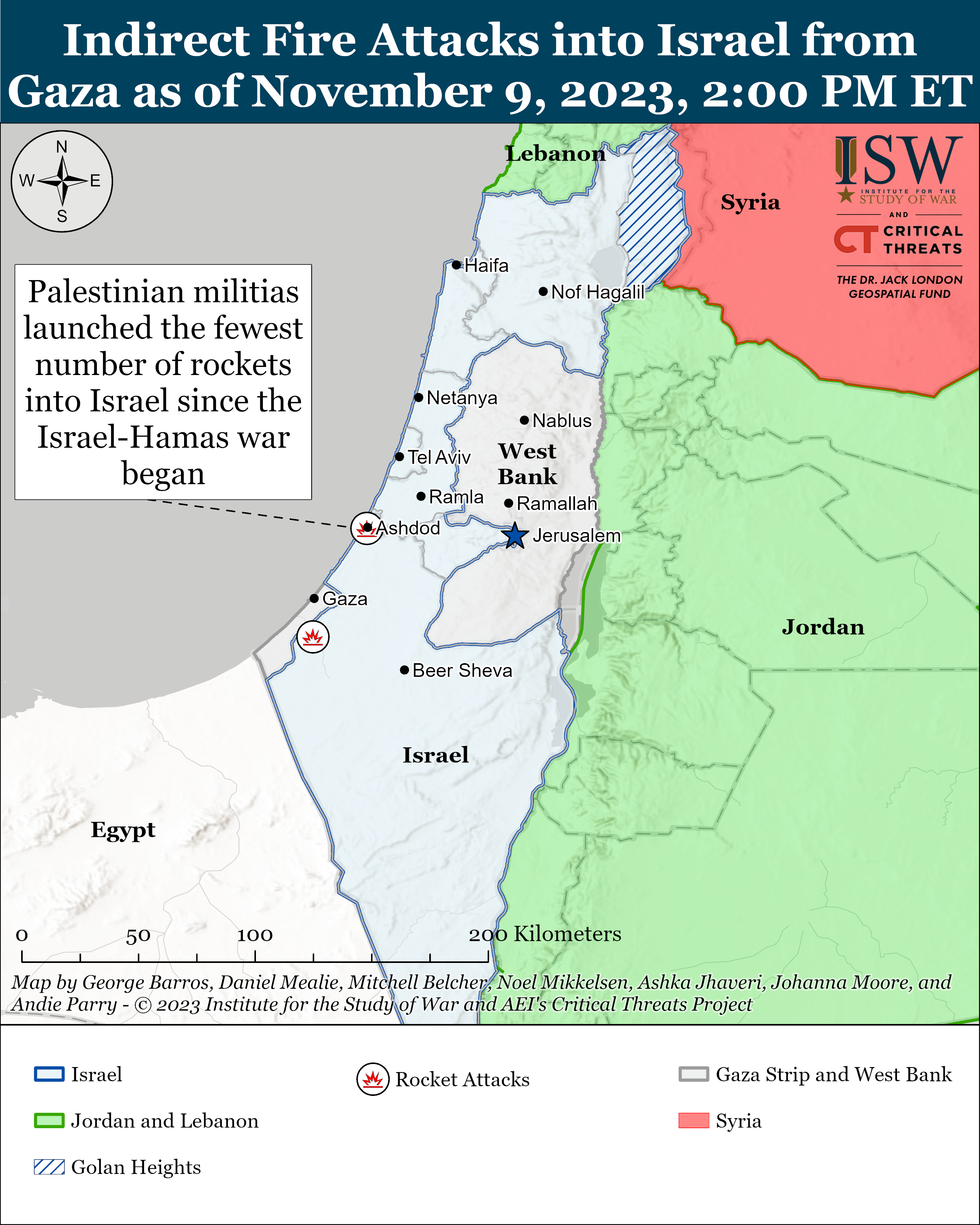
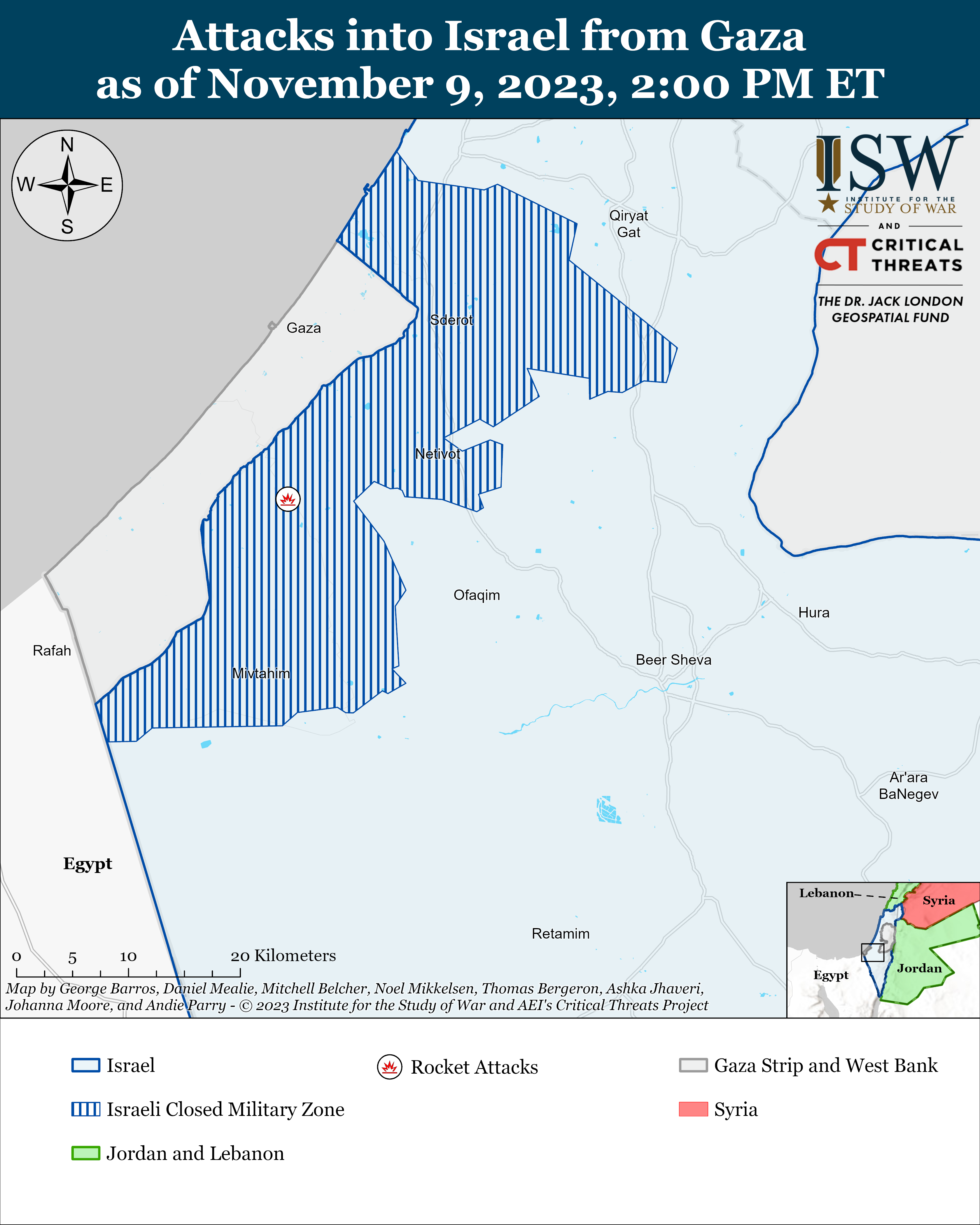
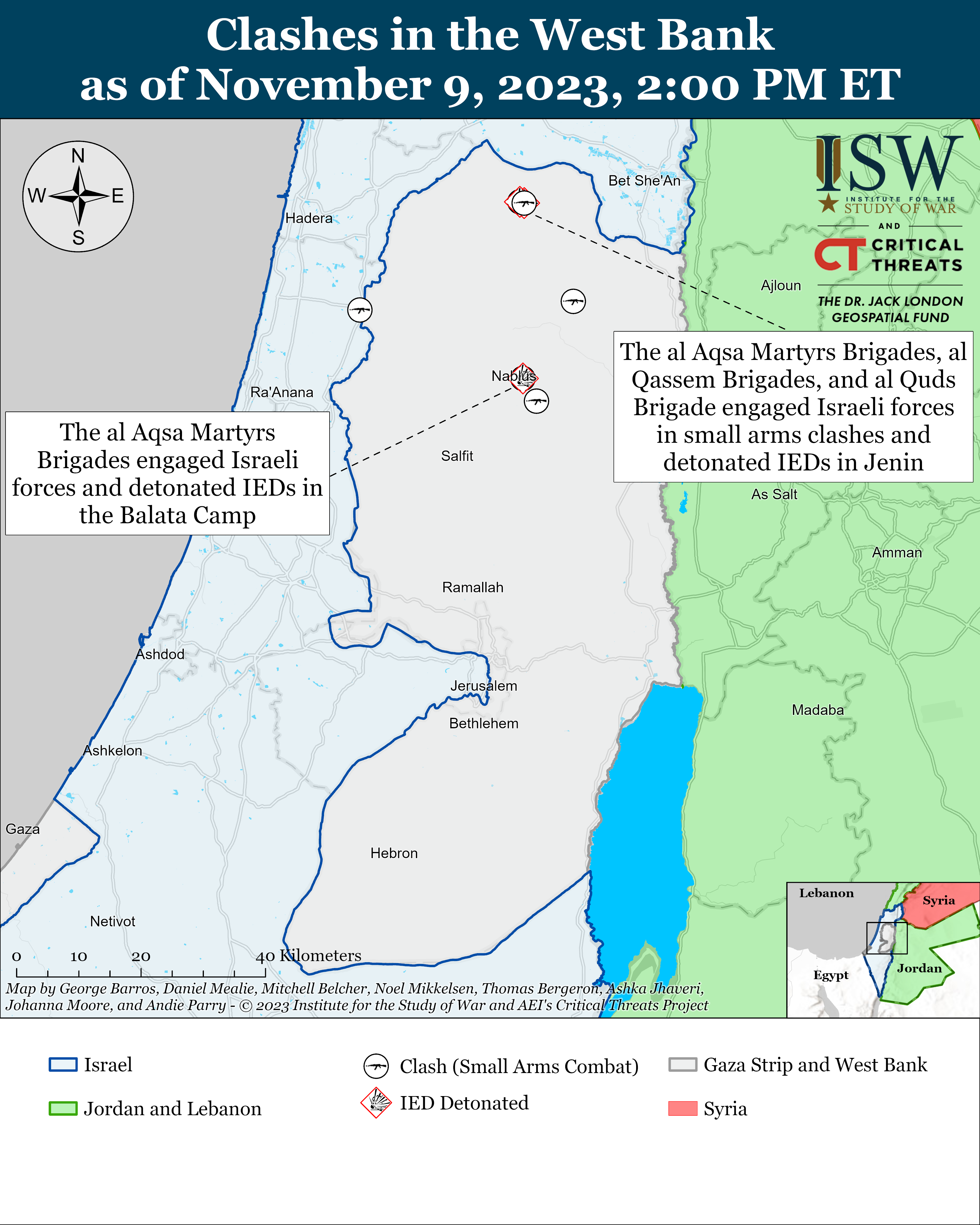
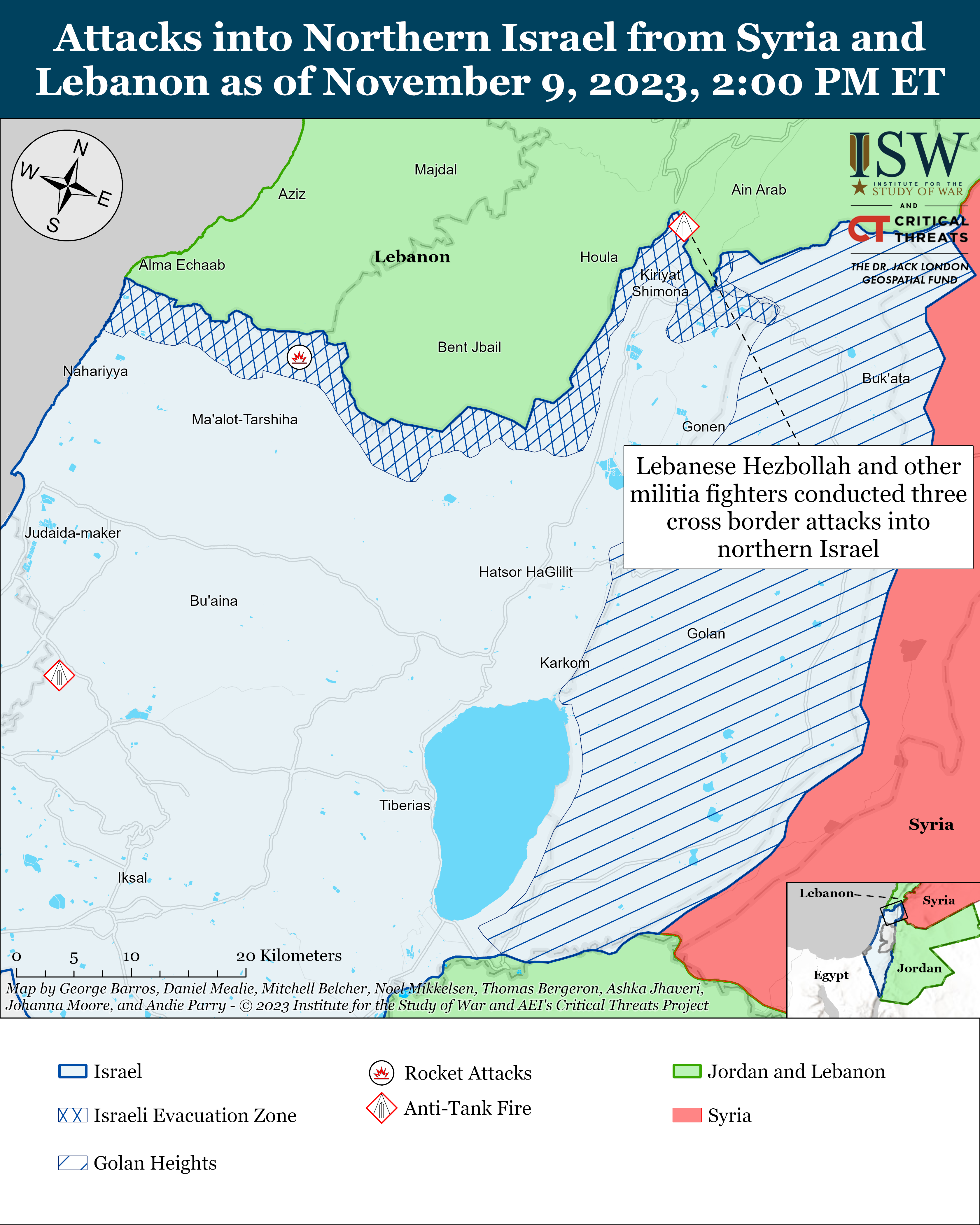
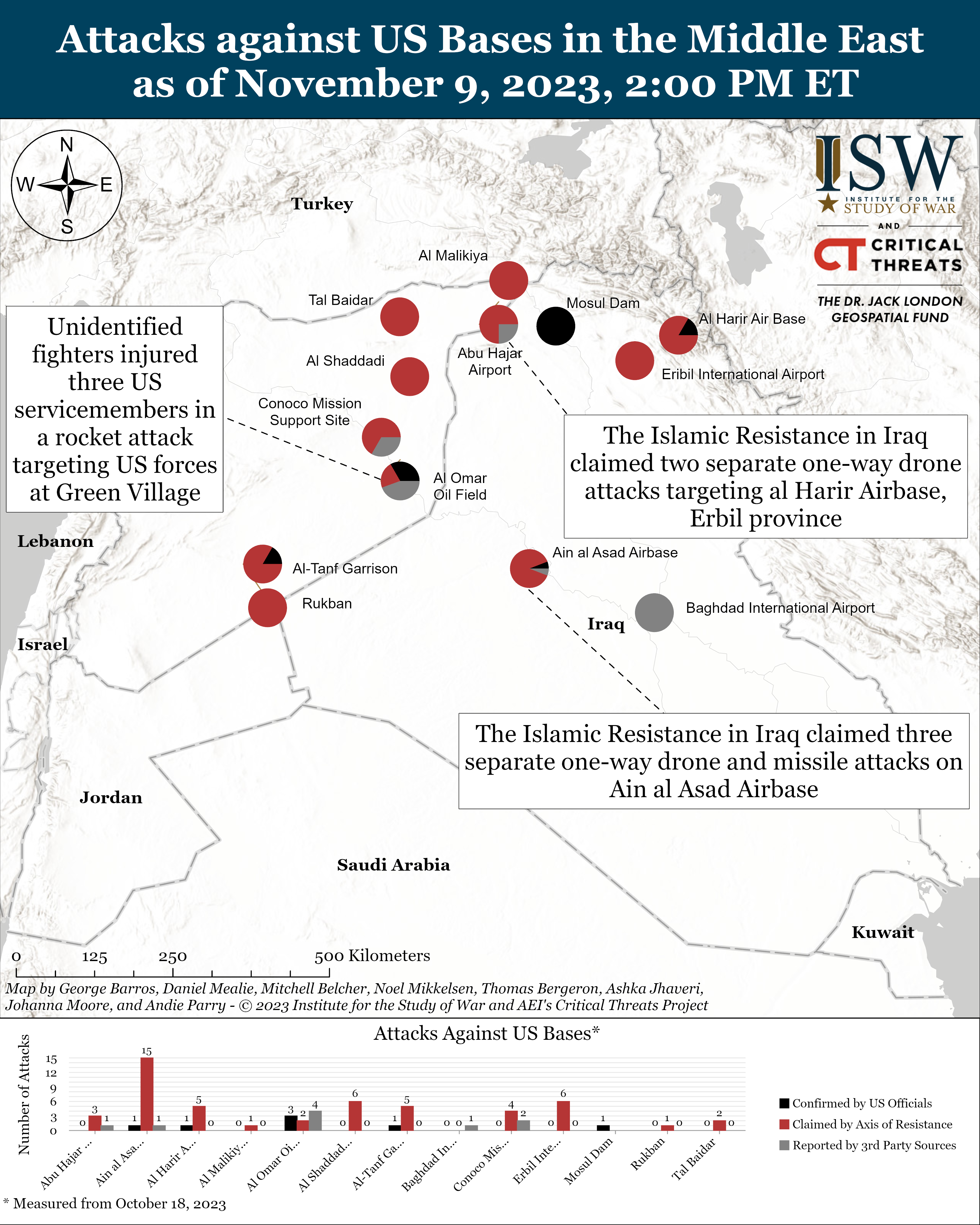
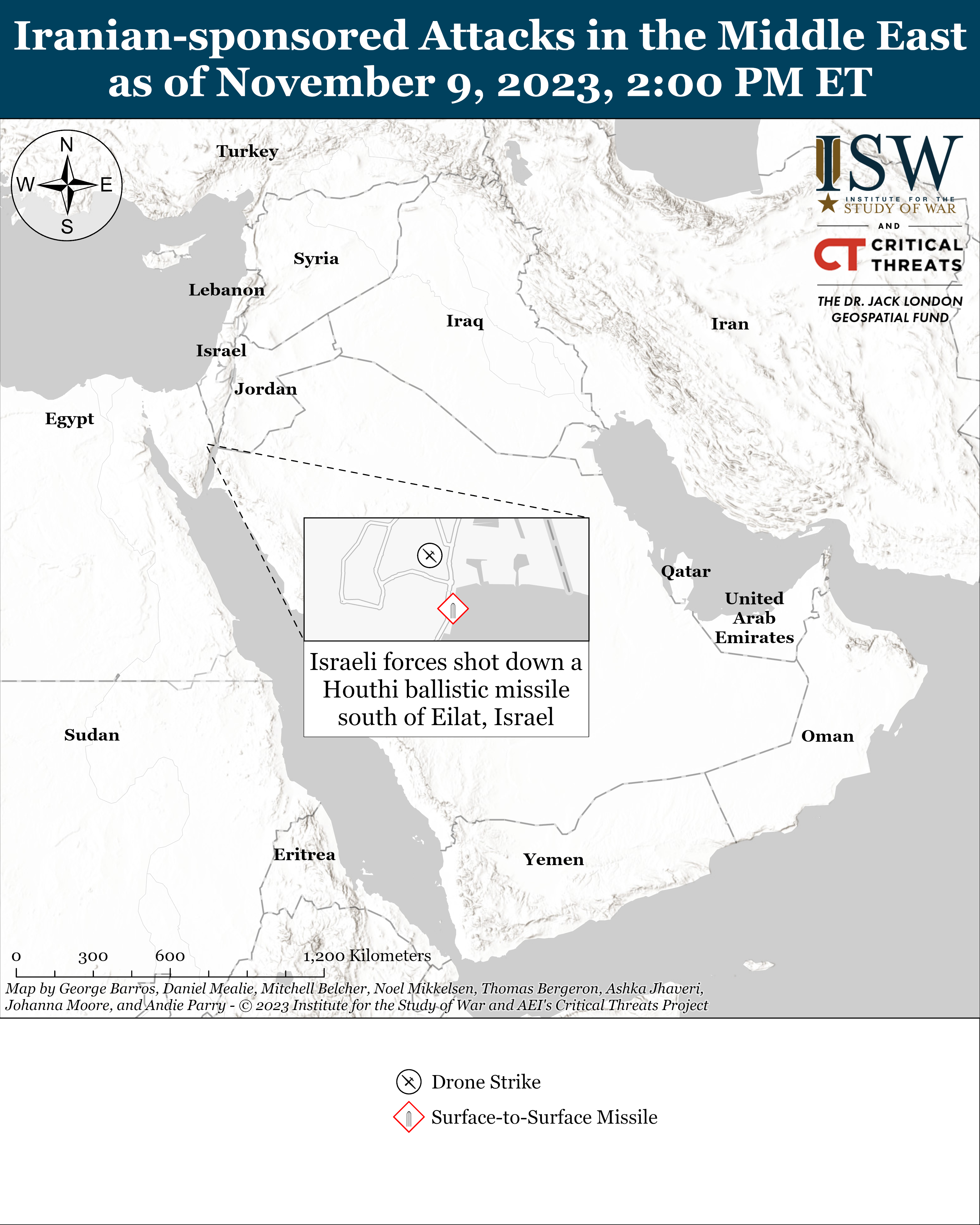
No comments:
Post a Comment